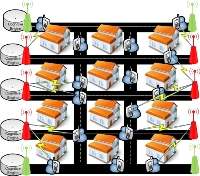Radio Resource Allocation in Beyond Next Generation Wireless Systems
The demand for mobile traffic is estimated to increase exponentially in future wireless networks. Hence, these networks will require denser deployment of base stations, which can potentially lead to significant increase in energy consumption, to meet the estimated high traffic demand. As a result, beyond next generation wireless systems will be expected to deliver high data rates and ultra-high capacity density in an energy efficient and environmentally friendly manner.
In this project, radio resource allocation and topology management schemes will be developed and evaluated in order to achieve the goals of high capacity density and energy efficiency for beyond next generation wireless networks. These schemes will aim to reduce energy consumption in the network when traffic level is not optimum by adjusting the number of active base stations in accordance with the traffic load and mitigating interference. The schemes will also apply different degrees of cognition so that nodes in the network can learn about their surrounding environments and make informed decisions based on the knowledge acquired.
Both simulation and analytical techniques, such as game theory and queuing theory, will be employed in the evaluation of the performances of developed schemes. This project will be integrated with other activities going on within the group.
Key objectives
- Develop cognitive resource allocation schemes
- Develop topology management techniques
- Evaluate performance of schemes with different individual traffic types and mixed traffic
Outputs
- Energy efficient cognitive resource allocation and topology management schemes
- Simulation and analytical results comparing performances of energy efficient schemes
- Conference and journal papers

Members
- Abimbola Fisusi
- David Grace
- Paul Mitchell
Dates
- Start: February 2012
Research
